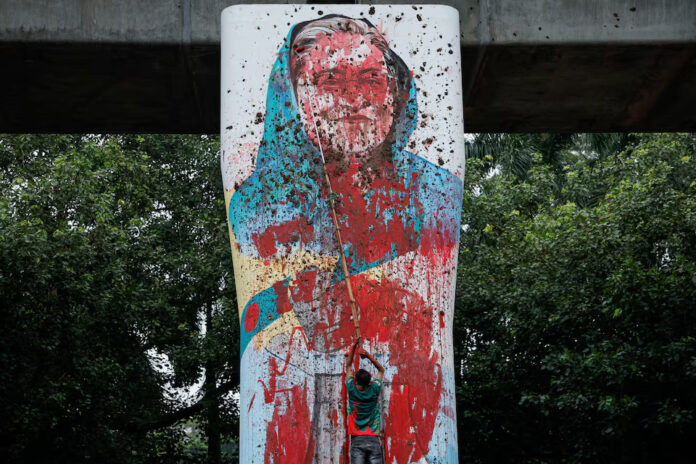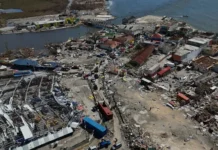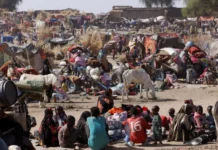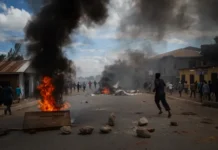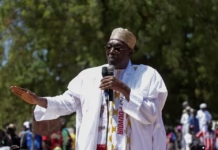One year after former Prime Minister Sheikh Hasina fled Bangladesh amid a wave of violent student-led protests, the South Asian nation of 173 million continues to wrestle with political instability, incomplete reforms, and deepening uncertainty over its democratic future.
The day marks the anniversary of a historic turning point, when mass demonstrations led by the Students Against Discrimination movement spiraled into widespread unrest, ultimately forcing Hasina to flee to neighboring India on August 5, 2024. Protesters initially targeted the public sector job quota system but rapidly broadened their demands to include Hasina’s resignation. The crackdown that followed claimed hundreds of lives and left thousands injured, peaking on the day of her departure when demonstrators stormed the prime minister’s official residence.
In the wake of Hasina’s exit, an interim government was formed under the leadership of 85-year-old Nobel Peace Prize laureate Muhammad Yunus, who took on the role of de facto prime minister. Tasked with restoring order and preparing for national elections, Yunus’ administration pledged sweeping institutional reforms, including restoring a non-partisan caretaker government, reforming the Election Commission, and depoliticizing state institutions.
While initial steps were taken toward consensus, progress has largely stalled. Fundamental issues, such as constitutional amendments, judicial independence, and proposals for a bicameral legislature, have sparked deep disagreements among political parties. Political analysts warn that a growing gap between public expectations and governmental performance could erode confidence in the transition process.
A central challenge for Yunus’ government is balancing reform with demands for swift elections. While Yunus has proposed February 2026 as a tentative election date, the opposition Bangladesh Nationalist Party (BNP), led by former Prime Minister Khaleda Zia, insists on elections by December 2025.
Further complicating matters is the suspension of the Awami League’s party registration, effectively barring Hasina’s once-dominant party from contesting elections. Despite serious allegations of human rights abuses during the 2024 crackdown, many citizens and observers believe the party’s inclusion is vital for any election to be deemed legitimate.
The rise of the National Citizen Party (NCP), a political movement born from the 2024 protests, has raised eyebrows. Critics accuse Yunus’ administration of favoring the NCP, a claim the government denies. However, the perception of bias threatens to cloud the credibility of future elections.
Since Hasina’s ouster, Bangladesh’s political climate has changed in notable ways. Rights groups and analysts report greater freedom of expression and a halt in the forced disappearances that characterized the previous administration. However, law enforcement remains inconsistent, and incidents of mob violence, attacks on journalists, and harassment of minorities, particularly women, continue to be reported.
According to rights group Ain o Salish Kendra, mob violence claimed 199 lives between August 2024 and July 2025. Human Rights Watch (HRW) has expressed concern that while some authoritarian practices have diminished, Yunus’ interim government has adopted troubling tactics of its own, including arbitrary detentions, politically motivated prosecutions, and the continued use of the repressive Special Powers Act.
“These actions often target supporters of the Awami League,” HRW said in a statement, noting that the cycle of repression appears to have continued under a new banner. The government has denied all allegations of misconduct.
To mark the anniversary of last year’s uprising, the government is set to unveil the July Declaration, a comprehensive charter outlining a roadmap for democratic reform. Drafted in consultation with student leaders and political parties, the declaration is expected to reaffirm commitments to electoral integrity, constitutional changes, and institutional accountability.
While hailed as both a tribute to the protest movement and a strategic framework for political transition, critics caution that the declaration risks being purely symbolic without accompanying legislation and broad parliamentary consensus.
As Bangladesh marks a year since the dramatic exit of Sheikh Hasina, the country finds itself at a critical juncture. The interim government faces immense pressure to deliver on promises of reform, maintain peace, and pave the way for inclusive and credible elections. Whether it can meet those expectations, or whether instability will continue to haunt the nation’s future, remains to be seen.
Written By Rodney Mbua









